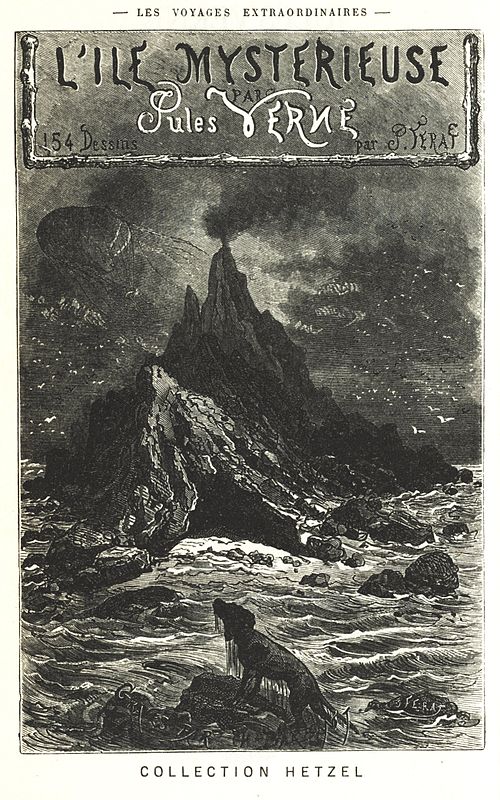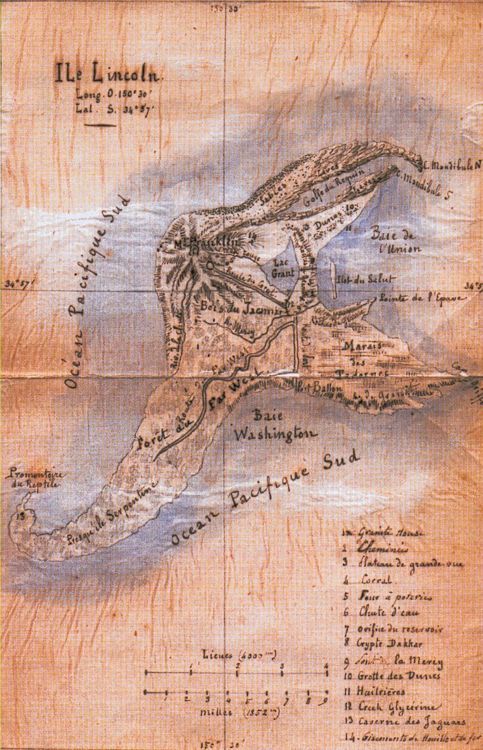This month marks a century and a half since the publication of Jules Verne’s The Mysterious Island. Maybe you think you don’t care, but read on. That novel changed a genre forever, and pointed readers toward new ways to think about survival.
Partial Summary
Near the end of the American Civil War, five Union prisoners escape a Confederate camp by balloon. Swept away by a storm, they must, at last, abandon their balloon and jump into the sea. They crawl ashore and identify the landmass as an island. With ingenuity and determination, they survive four years there despite suffering numerous misfortunes. In time, they cultivate crops and raise animals, build a pottery kiln, a metal forge, and even a telegraph.
As a Sequel
The novel attempts to serve as a sequel to two earlier books—In Search of the Castaways and Twenty Thousand Leagues Under the Seas. Though Verne connected the novels with some dramatic skill, he botched the timelines. He wrote a footnote attempting to explain the date discrepancies, but it did little more than inform readers of his awareness of the problem.
As a Robinsonade
Something about island castaway stories touch us. Could we, too, endure in a remote locale, out of contact with friends and family, deprived of the comforts of civilized life? We take nature walks and go on camping trips, but do so while clutching smartphones, knowing we’ll soon return to our big-screen TV, while our door camera monitors the outside world.
In 1719, Daniel Defoe wrote Robinson Crusoe, igniting an explosion of marooned-on-an-island stories, now called Robinsonades. Verne loved islands and had read both Robinson Crusoe and Johann David Wyss’ The Swiss Family Robinson. However, he deplored those authors’ choice to maroon their castaways along with survival equipment, the very tools and artifacts of civilization they needed. By contrast, Verne dropped his characters on an island with two watches, a match, a grain of wheat, and a metal dog collar.
This denial of resources became the standard for later Robinsonades, forcing characters to innovate and use available raw materials. No author or scriptwriter since Verne would dare equip their characters with large quantities of helpful supplies.
As a Comment on Civilization
Verne’s marooned characters don’t just scrape by. Bit by bit, they morph from castaways to colonists. In effect, they don’t separate from civilization—they restart civilization in a new place. In four years, they retrace the technological advances of twelve thousand years of human history. From Stone Age to Iron Age to Electrical Age, they recreate mankind’s major innovations. Perhaps this shines new light on the saying, “you can take the man out of the city, but you can’t take the city out of the man.”
As a Bromance
The novel’s themes of survival, innovation, and perseverance stand out. But Nick DiMartino, in his book The Amputee’s Guide to Jules Verne, also detects a theme of male bonding. The castaways don’t argue, complain, or fight. They work together to survive. After they return to civilization at the end, they elect to live the rest of their lives together in the “wilderness” of Iowa.
With a Deus ex Machina
I suppose I can still call this a spoiler alert, even for a book 150 years old. What makes the island so mysterious? Peculiar things happen on occasion, aiding the castaways just when hope appears lost. Near the end they discover Captain Nemo, sole remaining member of the submarine Nautilus, has helped them when necessary. Not a deus (god), but he owns one heck of a machina.
As an Enduring Tale
The Mysterious Island still captivates today, in its sesquicentennial. Readers will enjoy the novel 150 years from now and beyond, because it asks a question applicable in any age. Could we, too, could endure if marooned on a remote island without our modern toys? Go ahead and read it. Explore Lincoln Island and imagine yourself being there. Accept this invitation to adventure, extended to you by—
Poseidon’s Scribe


